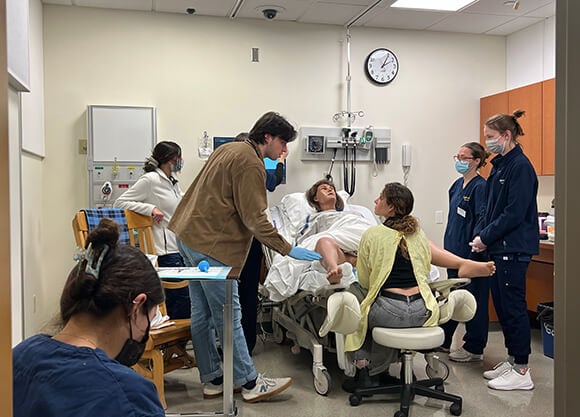
Undergraduate students have unique perspective of what it is like to deliver a baby
March 21, 2023

March 21, 2023

The simulation utilizes a life-like manikin that has entirely interactive heart and breath sounds, eye movements, palpable pulses, airways and a programmable monitor that hooks up to the manikin to track the vital signs of the patient.
The monitor can be programmed to display vital signs for a common delivery but also to mimic deliveries with complications like c-sections, breech and shoulder dystocia.
“At Quinnipiac, we are fortunate to be able to replicate specific clinical experiences that we want to ensure our nursing students are exposed to in preparation for their licensure exam and their professional career in nursing. We are able to scaffold the learning building from performing health assessment and physical examination skills to taking health histories to administering medications safely to performing interventions. Students are able to incorporate all of these aspects of training into dynamic simulations in preparation for their careers,” said Director of Simulations in the School of Nursing Liana Kappus.
During the simulation, students serve in the role of nurses taking care of a pregnant patient. Quinnipiac physician assistants also are included in the simulation by taking on the role of actually delivering the baby.
This technology better prepares students by promoting hands-on learning, and the chance to exercise knowledge learned in the classroom within a naturalistic patient scenario.
“During these simulations, students practice assessment skills, their clinical skills such as safe medication administration, and their clinical judgment skills. They are able to make gooddecisions, carry out those decisions, and see the results of their decision-making in a safe environment where there is no risk of harm to patients,” Kappus explains.
After the simulation, all students who participate debrief with professors to go over nursing objectives, opportunities for improvement, and things that they learned during the simulation.
This simulation can be repeated to help students engrain the information learned and retain new information to further their knowledge.
In the medical world, students can be expected to continuously learn new information so this repetitive practice can help students prepare for their future in medical practice.
Quinnipiac Today is your source for what's happening throughout #BobcatNation. Sign up for our weekly email newsletter to be among the first to know about news, events and members of our Bobcat family who are making a positive difference in our world.
Sign Up Now